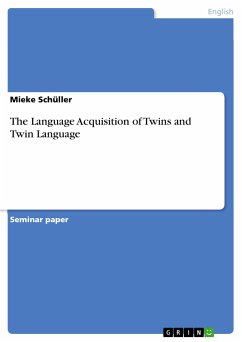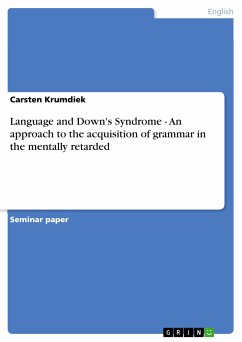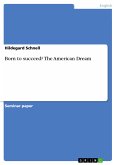Seminar paper from the year 2002 in the subject American Studies - Linguistics, grade: 2,0, Johannes Gutenberg University Mainz (Seminar für Englische Philologie), course: Language Acquisition in its Developmental Context, language: English, abstract: The examination of language acquisition is an interesting field of linguistic research, no matter whether primary language acquisition of children or second language acquisition of adults is concerned. In general, the ability to comprehend language and to communicate verbally is a defining aspect of the human being; in principle, the ability to acquire language and the will to communicate is present in every human child. Verbal communication is basic to human social interaction. Moreover, the study of language acquisition offers an insight into the operations of the human mind; according to the progression and pace of the language acquisition, the linguistic researchers can draw their own conclusions from the observations. Definitely, linguistics is an interesting scientific research field, which has not been fully examined up to now. Although linguistic researchers have done various studies on the acquisition of language and on speech impediments, there are still many linguistic peculiarities that cannot be explained thus far. During my research on the topic of primary language acquisition of children, I now and again came across a short remark or even a short chapter that commented on the peculiarities of the language development of twins. Further on, I learned about the phenomenon of twin language, often referred to as “idioglossia.” Since these hints aroused my interest, I decided to write my research paper on the topic of the language acquisition of twins and on idioglossia. With regard to linguistic research on the processes of language acquisition, twins offer an interesting approach, because their language development is reported to be different from the language development of same age singletons. In order to prove this thesis, it might be helpful to provide a short introduction to what is considered normal language development for children aged between about three months to about five years. Accordingly, the way in which the language acquisition of twins differs from the norm will be described. Of course, the fact that there are differences begs questions: What might be biological reasons for the delay? If compared to singletons, what are the differences in the twins’ bringing up, or in their interaction with the parents? There are diverse attempts to explain the speech disorders of twins, so the fourth chapter of this research paper is devoted to the explanations for the delayed development with regard to the biological and social factors. [...]
Bitte wählen Sie Ihr Anliegen aus.
Rechnungen
Retourenschein anfordern
Bestellstatus
Storno









